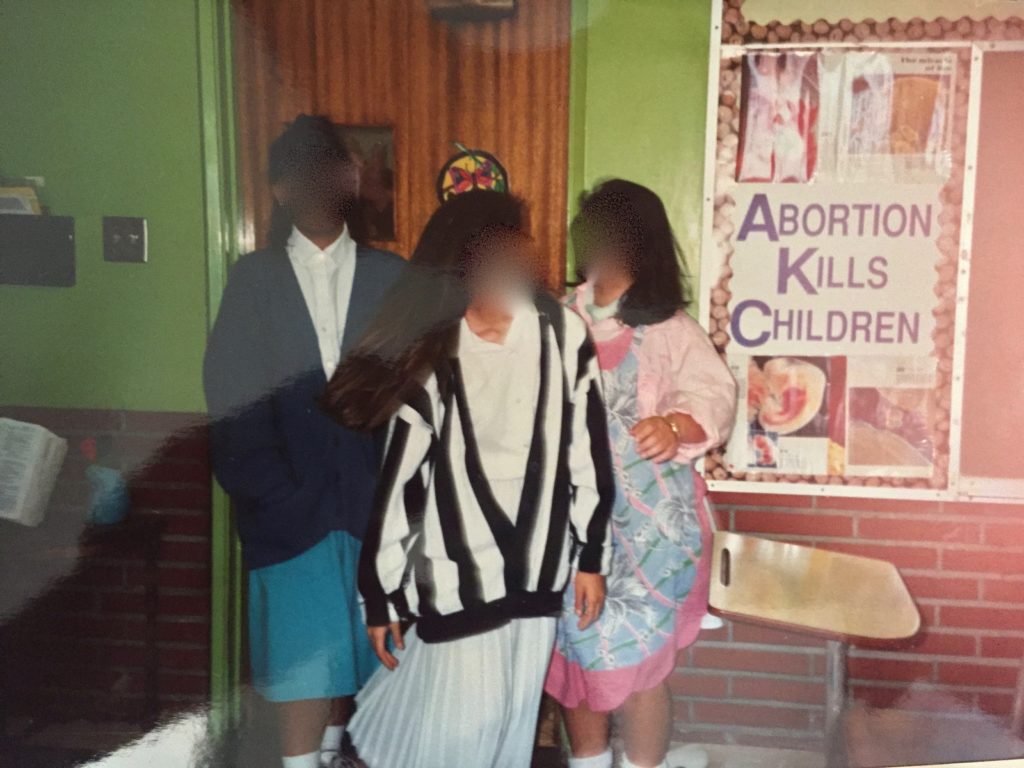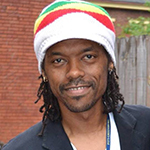Air Drop
Scrolling across the club walls: slash of silhouettes like a fist of razor blades, X’d arms and legs, Nagel hair. And they’re gone. The famous Troix-Croix Gymnasts. Twenty-two hours, countless takes. Three seconds of on-screen time. Count that. One-one-hundred-two-one-hundred-three-one-hundred.
Wedge of eight suits, shoulders slicing past the girls on reception, looking at no one looking at everyone. Bodyguards orbiting, their blunt dog heads turning, ears looped with wires.
The suits are high on the win and the celebration still only three hours old. They shouldn’t even be there but the center of their group, short black hair, wide grin, maverick eyes, is young enough to insist. It’s my party. Landslide win.
That disarming smile. The talk-show women notch their legs tighter, sit straighter, lean closer. What’s your secret senator? No false modesty here, no avoiding the question. Young people are speaking up. They want change. They want something better for their country. I’m lucky enough to be part of this movement. He’s not the whole thing—just a part. The disarming smile. What does the rest of the senate think of him, a thirty-something? I’m thirty-two. Wow. They’re dazzled. He’s quick to point out that John Henry Eaton was younger – twenty-eight. Sworn in on November 16 1818. Laughter. So you’re the second youngest. Sure. But there are other twenty-eight year-olds out there who are ready to serve. That’s what we’re here to do—serve our country. High-wattage smile into the camera.
Nearly everyone’s excited about the New Party. The old parties are less excited. Snide social media commentary about little kids with loud voices. The new senator has a loud voice. But he also has a sharp budget proposal, shiny new immigrant, tax, and medical care reforms—the result of eight months’ consulting, crafting, tweaking, leaking and poaching. Because all great ideas come from other great ideas.
Shoulders knuckling forward, the suits push into the lounge area just as the next part of the new Trois-Croix promo zeros in: full screen close up of thick-lashed eyes, and pupils like trapped stars against blue-green irises. The senator stops. Who has eyes like this? Does the search: Colomba. Pupil irregularity.
The fast-buzz cocktail of alcohol and cocaine brakes/accelerates and it’s that movie moment when the world rushes up and teeters on three seconds. What happened to her? Is she wearing contacts?
And the eyes are gone.
The others slap him on the back, Come on Buzz Lightyear. Come on, you dick. Hey don’t call him a dick. Sorry. Senator Dick. Cheering. You did it. We did it. We all did it. You’re next. No, you are. Did you hear? Charlton’s going to run. Charlton? Miami Dolphins? He’s great. He had that head injury. He doesn’t play anymore. His head’s okay though? He can still talk, right? Does it matter? Hahahaha. Charlton. Remind me to call him. Okay, Drum. That’s Senator Drum to you.
The starburst eyes. What color were they?
The Smoke and Feathers VIP Lounge is at the back of the club and you can only get in with special clearance and a quad-digit deposit. She watches him watching her behind her gold and black mask. She leans her elbows against the bar. Watches him scan her body, the lean long muscles, the flat stomach. She reaches around for her drink so he can take in her high ass.
Here, he’s not a senator. She walks over to the jeweled jukebox and pushes buttons. Can’t Take My Eyes Off You. She lifts her chin at him. He stands up, sticks his hands in his pockets. As she walks over, he smiles his disarming smile, overdoes the drink slur to cover his nerves,
—You wanna dance?
—You have to get me to come to you. Get up. Sing with Franki.
She walks back to the bar, props her elbows and leans back.
He’s unsure. Is she making fun of him? She’s telling him what to do? No one—
You’re just too good to be true/can’t take my eyes off you.
She lifts her glass and toasts him.
He begins to mouth the words, You’d be like heaven to touch.
She calls across,
—Can you dance?
The suits cheer him on and he lifts half-clenched hands, shrugs one shoulder at a time, shuffles from foot to foot, a dud boxer. He watches her, smile slightly desperate.
At the chorus, she skims across to him, I love you baby, steps between his shuffling feet, glitter-bright thigh hard to Prada crotch, grabs his hips and circles them against her. And again and again. She locks his eyes. Her thigh, his erection, his hips moving against hers, those eyes eight inches from his, the strange pupils with the flaring edges like they admit much more than light.
She feels him: pressed, aroused, appalled. As the second verse arrives, she releases him and moves back. You’re just too good to be true. He tries to sing along and dance but his Gucci feet barely move and his dud-boxing-dance shuffle is pathetic enough that she takes pity on him.
She leads him to his seat, the suits cheering and clapping.
—Thanks for the dance.
She walks away from him and out of the room in less than seven seconds. One-one-hundred, two-one-hundred, three-one-hundred. His voice doesn’t work. His hands don’t move. He stands there like a melting snowman.
The suits, What the fuck get a load of would you can you Jesus.
A group of dancers has come in. They wear pink gauze tops and silver thongs. They have glitter on their faces arms, legs. Boys and girls with slender limbs, lithe against the music. The suits are whooping and clapping. The anemone arms beckon the dancers. One, then another, is detained by white hands cuffed with thick-money watches.
Girls and boys, wide cheekbones, eyes flooding-black, long hands feathering shapes around the white expensive hands. They might have been designed for graceful twining. The suits leave for other rooms, with one, two, three dancers.
The senator is still snow-manned, frozen out of the music, the dancing, the twining. A headrush that may be the drugs, maybe the tequila. The strange experience of being astonished. When was the last time he couldn’t find words? His edges are crumbling. He has been defied, outwitted, by a thin girl with eyes that stare into him but that he can’t stare into. Who is she to walk away from him? What is behind those pupils, tiny gaps between each star point? How can you really know anyone with eyes like that?
He steps away from the two dancers who are threading fingers around his neck and texts someone to text the manager. Get her. The one with the eyes. Room 4.
She turns up. Impatient with being summoned. Stalks into his room as he opens the door.
Flings the velvet sofa cushions on the floor.
—Turn your back.
And she collapses her limbs, bones rearranging in folds so that she disappears behind the soft cushion heap.
When he turns back he is confused. A small gap between the cushions allows her to watch him. He glances at the cushions and then looks about as though she ought to be hanging from the ceiling fan.
—I’m here, dummy.
No one calls him dummy.
She lifts her head and rises, swaying, boneless, until she’s standing.
He’s delighted,
—How did you do that? You just—but how do you—I mean, you can make yourself flat?
She kicks the cushions out of the way and shows him. Her limbs, folding, flattening. She lifts her head,
—For the show. They put me in a kind of flat box that you can’t see from the audience. So when I come out, the audience is all ooh ahh.
He touches her elbows, wrists, like he wants to make sure she has bones, thrilled by the magic of her body. His eyes are hot,
—How small can you fold up?
His pedestrian sexuality. He wants her against the wall. Does his boxing shuffle until she’s pinned. It’s easy to twist out of his hands. He has brute strength and weight. She has the flexibility of a water spider and knows how to deflect. Traps his gripping hand and uses her other hand to push his face. A swift inner ankle kick and she slips away from him.
He is baffled and angry. I-am-a-senator-eyebrows and I-am-a-senator-pinched-mouth and I-am-a-senator-puffed-cheeks.
She arranges her supple limbs on the bed and waits while he adjusts his pants, his face,
She gets him on his back, fucks him for less than five minutes. He’s convinced it’s longer because she brings him to the point of release three times before she lets him finish. He is weak, comatose. She slips on her bodysuit, coat, and red stilettos, slips out of the room.
For two days her phone blows up with his messages. She deletes them. He couriers a thick wad of $100 bills. She goes to Western Union, sends half to Ma, and saves the other half for the airfare back to São Paulo.
He’ll last a few weeks and it’s worth it for the cash wads she can use to feed the family and stay in São Paulo for a couple of months.
She messages back. How much? He responds with a number and the word “thousand”. She agrees to meet. Takes a train to another train, walks three blocks, and a just-like-the-movies black car door opens. They drive to an out of town airport with one hangar and a cluster of small jets that look like toys. At the back of the one single-story building, in a private room, he is there with two of the suits. He gets her to perform her magic boneless body trick again. He wants to see if she can fit into a golf bag. She can.
He looks like a boy. His bright eyes and flushed cheeks, like Jeffy’s when she brings him the yellow cake with chocolate icing, when they sing their sword-fight-with-bananas song, when she gets him up in the night, sssh quiet, so they don’t wake Ma, and they sit out on the back step and count the stars. You take the right side and I’ll take the left and we’ll meet in the middle. Except Jeffy only counts to twenty and sometimes he misses a few so they have to go back, and you can’t cheat because Jeffy will know. And sometimes there’s a shooting star and they put their hands over their mouths because it’s so lucky they’re laughing and trying to keep the laughter in is making it worse. And they don’t want to wake Ma. She wouldn’t be mad but it’s not fair because she has to leave the house at four anyway.
Until she loses her job. And the food goes. And the electricity goes. And the only things that come are the men who jam the door open with one foot.
And someone has to do something.
Like a cage of bird bones, her chin tilted to one side, her breathing shallow.
We’ll sneak you on board. A college prank. This is my emotional support animal.
His life is shaped around his successes: his father’s family motto (we always win), his mother’s pride (Drum couldn’t fail if he wanted to), the indulgent faculty, fraternity brothers who were as drunk (groping women against a wall) as he was.
He squares his Tom Cruise shoulders. He can out-run, out-wrestle, out-score any of them. Any of them, including best friend Stoat from college days. Hell, they once did four girls in a double bed. So hilarious. The girls kept falling out.
He stares at the terminal officer, Do you know who I am?Yes, Senator. Of course.
He tips his head back. The terminal official speaks in a rush, We are huge supporters, sir.
Inside the bag, she sighs. Is everyone so bowled over by one more white man with no sense of rhythm and adolescent sex skills?
She hears labored breath as she is carried up the steps and placed, carefully in the cabin. She gently rearranges her shoulders, her legs, pries the bag’s zipper open an inch and sees the red leather seats. It’s a flying boy-lounge. There is hearty laughter and the clinking music of glasses and silverware.
She puts one star-burst eye to the open hole again. Recognizes the two suits. The third is some kind of secretary. He hovers by the three, seated men, his tablet ready. He takes notes like there’ll be an exam later. He burbles into a phone. Connecting you now. I’ll hand you over now. He’ll talk to you now.
On the phone, the Senator turns into many people. His fast voice is for his contemporaries. Metallic, brief, powerful. Sometimes she guesses he’s talking to an older person. His voice drops, he speaks more slowly. He’s trying to mimic them, to show he’s one of them. She knows that trick. She used to do that before the acrobat gig. Take on a taste of Texas, Chicago, Brooklyn. And as the man—usually a man—warmed up, she’d stretch or crush the vowels a little more. Soon they were buying drinks and food and handing over a few twenties. Enough for a hand job. Truckers, night shift workers, nurses, emergency responders. Some of them would apologize, handing over their twenties and tens. You shouldn’t be doing this. You’re too young. She’d tell them: I want to go back to college and finish my degree. Sincere, determined. And they’d be encouraging, glad of the opportunity to be some kind of mentor, funder. They don’t want to hear another hard-luck-poor-as-shit story. People like a little hope with their hand jobs.
Sees: parts of legs, hands, a sweep of hair as someone bends down.
Smells: shampoo, sweat, meat, alcohol, popcorn.
Hears: women’s voices whispering. Hisses of s’s and sh’s and then a nasal accent, maybe Tennessee,
You want the pecawn pah, Senator?
No thanks, I’m good.
She would like pecawn pah. Any pah.
Feels: The bounce of the seat as he stands, the pressure as he sits back down.
Tastes: Fear like copper at the back of her throat. If he starts drinking he’ll forget about her.
Slips the zipper shut. Hears him speak,
Can you give me some space here? Now?
Feels: A sudden pressure as someone squeezes onto the seat next to her. The cramping starts from the back of her neck. Her feet, wrapped around her head, are going numb. The thigh muscles are twitching. She tells herself let go, let go.
Careful of that.
Hey—I like your emotional support animal, too.
The voice is snide.
Feels: The bag’s zipper jiggling.
Hears: the slap of open hand—on shoulder? Arm?
You’re pushing it.
Listen, I carried this—
Just go.
Smells: Stink of alcohol and bad breath. Does no one brush their teeth here?
Hears: Protocols aren’t reciprocated everywhere, Drum. Thought about getting this thing through customs?
The Senator speaks softly:
We’ll be okay. Just go.
Silence.
He opens the zipper all the way and she tumbles out. Hair painted onto her head, legs jello-ing, neck cracking. She’s sweating all over.
He’s whispering,
—I’m sorry. I would have gotten you out earlier—
She stretches each limb gently. She wipes her damp hair back,
—I’m not coming back in your damn bag. You can pay for a ticket.
She takes the handful of towelettes he offers and swabs off her face and arms.
He’s watching her,
—Twenty? Twenty-one?
Tries for nonchalant. Are they all this stupid?
—Am I a minor? No.
He smiles.
She’s good at this. She can fool a police officer, a truant officer, an Ivy League senator.
She turned seventeen three months ago.
She looks so small, curled up on the seat, hair pushed back, those astonishing eyes, the blue-marine of the irises. He holds up his cell phone and takes her picture.
Of all the people he knows, she is the one who wants the least. No political ambition, no agenda, no wheedling a space in his new entourage, a few moments of his time to plug a cause, proposition, special interest. She wants money but who doesn’t?
—I could use a shower.
He points to the back of the lounge,
—You can take one back there.
She’s astonished,
—A shower? On a plane?
—Towels, shampoo, robes.
She walks to the back of the boy-lounge, pushes the button next to a slim silver door and it swishes open.
Laughs,
—I can’t believe it.
—Go ahead.
She hesitates,
—You coming?
—Not enough room.
She closes the tiny silver space capsule. Steps out of her clothes. Pulls the thin shower curtain across and steps on the blue foot pad. A watering can sprinkle of warm water. A shower in the sky. She washes quickly, using the vanilla scented body wash, vanilla-scented shampoo. The luxury of a soft towel. It’s more like a hand towel but it does the job. Uses the bergamot body lotion. Rakes through her hair with the wide-toothed red plastic comb. Wipes a spot on the misted miniature mirror. Her strange self stares back. Who are you now? Next to the sink, a tray with four tiny glasses with clear liquid, maybe vodka or gin. She sniffs, downs one. Doesn’t have that alcohol burn.
She steps out without the towel. The two suits have come back in, no jackets, rolled-up sleeves. She grabs her discarded shirt. The senator laughs,
—Boys! Turn your backs for the lady.
They turn their backs.
—This is fucked up, Drum.
—Is she an adult? Does she have a passport?
—Relax—
—You need to get rid—
—That’s enough.
Silence.
Slides into her sweat pants, shirt buttoned.
Why are they so angry? He said it would be fine. That’s what rich people do.
Shit-shit-shit stuff shit stuff shit stuff. She looks around. Where did the echo come from? And how did it echo when she didn’t say anything out loud?
The Senator stares at the suits and she shivers. She wouldn’t want to be on his bad side.
His mouth tightens, his cheeks puff out. His mad face. This is much worse than his confused face.
—Remember who you’re talking to.
—Hey Drum—come on. This is us. We’re the same.
—This is my show. Mine.
She stays on the edge of the cabin, Instinct tells her not to approach him, not to talk to him. She is some part of his life that isn’t this. And it’s clear that her part is temporary.
The rest doesn’t concern her.
Doesn’t concern doesn’t concern doesn’t concern. She shakes her head. What’s going on?
His mouth is screwed up into a fist bud, a tiny anus,
—You guys are overreacting.
—Are you crazy? Do you realize the potential—
—Nothing is going to happen. We’ll get off the plane. We’ll meet the delegation. She’ll be part of the entourage. A secretary, personal valet or something.
His voice is petulant. They are spoiling his party.
—Look, Drum. You can have all the fuck-fests you want but not this time.
—If you get off the plane with your bendy bitch—
—Watch it.
The senator paces as much as the jet will allow.
The suits haven’t given up,
—The Central America Emergency Summit? We’re talking serious shit here.
—They’re mourning their dead. Over 500,000. And we’re there to show our deepest sympathies.
—And an aid package.
—Tied to an oil deal.
The senator is unamused,
—I’m aware of that.
—So, you can’t turn up with this—
—lunchtime thot—
Talkingtalkingtalking like she’s not even theretherethere. She steps forward,
—Uh, excuse me? Do any of you actually-actually know, I mean, know what a thot is? Because I’m not not not. I’m not not not—
What’s with the echo?
—Shut up—
—Don’t tell her to—
And the echo breaks through and everything gets loud and painful like she’s plugged into a sound system. Like she’s the sound system. And these fuckers are breaking the sound. Breaking her sound. Break-breaking. Her.
Everything swirling around the cabin, swirling around the inside of her stomach. Who the fuck-fuck-fuck do they think they are?
From the nearest lunch tray, she grabs one of the delicate silver forks and sticks it into the bare arm of the nearest suit. He screams.
—Fuck! What the—
—Get her—
—My arm—
She picks up another fork and lunges at the other suit but he dances back, arms spread wide,
—Drum—fucking do something with your—
The senator steps forward. She levels the fork with his eyes,
—A thot? A thot?
—Hey—hey. Don’t listen to them. Listen to me. You’re okay. We’re okay. Okay? It’s you and me.
—Tied to an oil well.
—What?
He looks directly at her but for some reason his face keeps sliding away as though it’s rubber. Everything is sliding away. She has to fight to keep the fork straight. Keep it pointed. Keep it up.
She snatches at a glitter from the tray. Peers at it. A knife with a curl at the end of the blade. A what—fuck—a cheek—a cheese—a cheese knife. Who’s knife is worth the cheese?
He stretches out a hand,
—Why don’t you put that down and let’s—
But the cheese knife writhes in her hand She holds up the curly blade. It has two little pointy bits at the end.
The suit she didn’t stab is trying to get the knife from her. He is a thief. Thief. Thief.
They are all thieves.
She holds the blade away. Then lifts it to the suit’s eye level. What would his eye look like on the end of the knife. That’s a funny idea and she begins laughing. The eye would be looking at her. Would it see by itself or would it see through the mind of the suit? Mind? Mind the cheese.
She is sorry for Stabbed Arm,
—Is there blood?
He snaps his head up,
—Stay the fuck away from me.
She holds the cheese knife up—it is not for him. He is only worth a fork and this little cheeky knife is worth much more.
The other suit,
—C’mon, sweetie, put the knife down. What’s her name?
But the senator says nothing, He’s looking at her. He is seeing her.
—I—never told you how much I like your eyes.
That’s funny, too. That’s funny. That’s—
—That’s what first made me look twice. Your incredible eyes. Like something in there just exploded. You know—like a flower.
A flower exploded in her eyes? Who the fuck voted for him?
She shakes her head.
Cliché Man,
—C’mon sweetie—
—I’m not your fucking sweetie or honey or baby or sweet cheeks.
Stabbed Arm,
—I’d never call her sweet cheeks.
Cliché Man,
—Where’s our FBI protection?
The Senator moves in between her and Cliché Man.
—Listen, it’s just you and me.
—And your tiny-brain body guards—
—They’re not body guards.
—Hoo boy you can say that again. That again. They couldn’t guard a dead dead dog. You can say that again. Know what? That one smells like ass. Remember when I stuck one finger up your ass and you said, No, three—
—Let’s talk about your eyes. Like flowers.
His voice is loud, like bricks chucked and bouncing across metal.
The suits say nothing. It’s good they’re quiet. Less echo.
She laughs,
—You said that already. You said that.
It’s funny how he does that. Maybe it’s how the rich people do it—just say the same shit over and over again until someone believes it.
She leans back against the cabin wall. She’s discovered how to twirl the knife. She can flip and swivel it against the back of her fingers. How did her hand do that? The glitter knife balances and jumps and flicks back into her hand. Did she just learn it? Or did her hand always know? Does your body know how to do things, like jump and arc and hold a knife, but waits until you’re ready? That means she’s a slack-liner and a deep-sea diver and a snake dancer and a conductor.
A conductor. A conductor.
The senator moves, small movements that bring him closer.
The suits makes noises that bounce and flatten off the cabin walls. Their words don’t sound like words.
She has this idea. If she keeps one hand on the cabin wall, her words will be conducted directly to the senator. He’ll hear exactly what’s in her head.
He’s staring at her like he’s concentrating hard. Maybe he’s already hearing her. Maybe he’s—
But his eyes are looking at her like she’s a breakfast tray he didn’t order. His mouth is going small.
The only thing is
The only thing is
The only thing
The thing is that if she only
She drops her hand with the knife. She drops her body into a resting pose. Except for her thighs, tense under the sweatpants.
She can drop her whole body into a space no larger than a floor cushion.
Everything could drop right now.
How did it all change? One minute she was going into the—what was the thing she went into? The space capsule. Something was wet. Something was warm. The soap smelled like open windows. Something bright in a small glass.
One minute they were were taking phone pics—I want to make sure I get your eyes.
One minute is less than—
One minute is greater than—
Cliché Man is holding the golf bag.
Stabbed Man is holding his arm.
The senator is holding nothing.
This is the three seconds before it all happens
One-one-hundred two-one-hundred three-one-hundred
One or all of them will step forward
One or all of them will continue to wait
One or all of them will make some comment about shutting her up
She will stay still and loose, except for her balanced thighs that will inform the arm, that will lift the wrist, that will tense the knife, gently, and flicker like an afterthought to the throat of the first one to reach her.
And then they will use their big arms and their body weight to pummel and keep her down and she will end up in the bag one way or another.
After that it is a matter of air and sound and
She and her starburst eyes, unique and startling and she was good enough to be part of the new promo. It’s her eyes sliding across the wall.
The senator weeps actual tears and someone hands him a glass of whiskey, dims the
lights in the cabin. He sips.
His reading light flares off white pages. In three hours he’ll be giving his speech of
compassion and hope for the future. He puts the folder on the seat next to him. Lifts
the heavy Glencairn glass. A shuddering constellation of lights scintillates across the
white cabin walls. His hand shakes. One-one-hundred, two-one-hundred.
Three-one-hundred.
And his friends and their friends, and the reaches of his particular competent orbit will close around the small irregular gap that happened in between this event and the one after. It is only one girl, alone, without family.
The main thing—the senator will emphasize this with a pointing finger at each of the televised conferences—is the Greater Good For The New World.
It’s a fine slogan. It has rhythm. It will look good on a t-shirt.

Sandra Hunter’s fiction has won the 2018 Lorian Hemingway Short Story Competition, 2017 Leapfrog Press Fiction Contest, 2016 Gold Line Press Chapbook Prize, October 2014 Africa Book Club Award, and three Pushcart Prize nominations. Her story, “Finger Popping” won second place in the 2017 Katherine Anne Porter Prize in Short Fiction. She is a 2018 Hawthornden Castle Fellow and the 2017 Charlotte Sheedy Fellow at the MacDowell Colony. Her books include Losing Touch, a novel, a fiction chapbook, Small Change, and a fiction collection Trip Wires. She is working on a trilogy of novels set in Johannesburg, Los Angeles, and Amsterdam. sandrajhunter.com

 BACK TO ISSUE
BACK TO ISSUE







